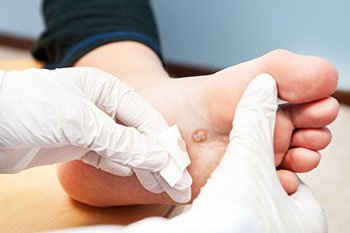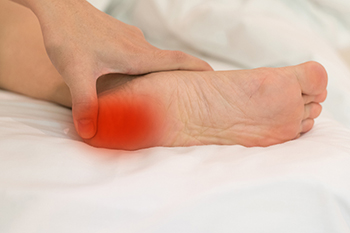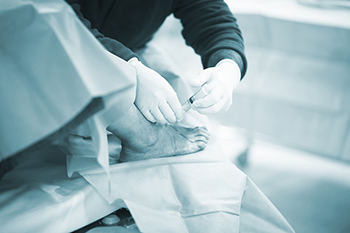Items filtered by date: October 2021
Numb and Tingling Feet
 If your feet are numb, tingling, or sensitive to the touch, you may have peripheral neuropathy. The term “neuropathy” refers to nerve damage. This condition affects one to two percent of Americans and can significantly impact your lower limbs. In addition to the altered sensations mentioned above, people with neuropathy may also experience pain, cramping, muscle weakness, a loss of reflexes, and difficulty walking. Neuropathy is often associated with preexisting medical conditions, such as diabetes. If you have symptoms of nerve damage in your feet or ankles, it is strongly suggested that you are under the care of a podiatrist who can help you manage this condition and maintain the health of your lower limbs.
If your feet are numb, tingling, or sensitive to the touch, you may have peripheral neuropathy. The term “neuropathy” refers to nerve damage. This condition affects one to two percent of Americans and can significantly impact your lower limbs. In addition to the altered sensations mentioned above, people with neuropathy may also experience pain, cramping, muscle weakness, a loss of reflexes, and difficulty walking. Neuropathy is often associated with preexisting medical conditions, such as diabetes. If you have symptoms of nerve damage in your feet or ankles, it is strongly suggested that you are under the care of a podiatrist who can help you manage this condition and maintain the health of your lower limbs.
Neuropathy
Neuropathy can be a potentially serious condition, especially if it is left undiagnosed. If you have any concerns that you may be experiencing nerve loss in your feet, consult with one of our podiatrists from Barry University Foot and Ankle Institute. Our doctors will assess your condition and provide you with quality foot and ankle treatment for neuropathy.
What Is Neuropathy?
Neuropathy is a condition that leads to damage to the nerves in the body. Peripheral neuropathy, or neuropathy that affects your peripheral nervous system, usually occurs in the feet. Neuropathy can be triggered by a number of different causes. Such causes include diabetes, infections, cancers, disorders, and toxic substances.
Symptoms of Neuropathy Include:
- Numbness
- Sensation loss
- Prickling and tingling sensations
- Throbbing, freezing, burning pains
- Muscle weakness
Those with diabetes are at serious risk due to being unable to feel an ulcer on their feet. Diabetics usually also suffer from poor blood circulation. This can lead to the wound not healing, infections occurring, and the limb may have to be amputated.
Treatment
To treat neuropathy in the foot, podiatrists will first diagnose the cause of the neuropathy. Figuring out the underlying cause of the neuropathy will allow the podiatrist to prescribe the best treatment, whether it be caused by diabetes, toxic substance exposure, infection, etc. If the nerve has not died, then it’s possible that sensation may be able to return to the foot.
Pain medication may be issued for pain. Electrical nerve stimulation can be used to stimulate nerves. If the neuropathy is caused from pressure on the nerves, then surgery may be necessary.
If you have any questions, please feel free to contact our offices located in Miami, North Miami Beach, Miami Beach, and Tamarac, FL . We offer the newest diagnostic and treatment technologies for all your foot care needs.
What Is Heel Fat Pad Syndrome?
The heels of our feet are cushioned by fatty tissues that form a heel pad. This structure acts as a shock absorber, protecting our heel bones from injury. Acute or chronic trauma to the foot and aging can both wear away the heel pad, causing deep, bruise-like pain. People who are older or obese, and those who have rheumatoid arthritis or receive corticosteroid injections into the feet are at an increased risk of developing this condition. Treatment for heel fat pad syndrome is typically conservative and involves resting and icing the affected foot, wearing more comfortable shoes or orthotics, and taking non-steroidal anti-inflammatory drugs to reduce pain. If you are experiencing heel pain, it is suggested that you seek the care of a podiatrist.
Many people suffer from bouts of heel pain. For more information, contact one of our podiatrists of Barry University Foot and Ankle Institute. Our doctors can provide the care you need to keep you pain-free and on your feet.
Causes of Heel Pain
Heel pain is often associated with plantar fasciitis. The plantar fascia is a band of tissues that extends along the bottom of the foot. A rip or tear in this ligament can cause inflammation of the tissue.
Achilles tendonitis is another cause of heel pain. Inflammation of the Achilles tendon will cause pain from fractures and muscle tearing. Lack of flexibility is also another symptom.
Heel spurs are another cause of pain. When the tissues of the plantar fascia undergo a great deal of stress, it can lead to ligament separation from the heel bone, causing heel spurs.
Why Might Heel Pain Occur?
- Wearing ill-fitting shoes
- Wearing non-supportive shoes
- Weight change
- Excessive running
Treatments
Heel pain should be treated as soon as possible for immediate results. Keeping your feet in a stress-free environment will help. If you suffer from Achilles tendonitis or plantar fasciitis, applying ice will reduce the swelling. Stretching before an exercise like running will help the muscles. Using all these tips will help make heel pain a condition of the past.
If you have any questions please contact our offices located in Miami, North Miami Beach, Miami Beach, and Tamarac, FL . We offer the newest diagnostic and treatment technologies for all your foot and ankle needs.
Arthroscopy: A Technological Marvel
In arthroscopic surgery, a small incision in the skin is made to allow a narrow instrument (arthroscope)—with a light and video camera attached—to be inserted into the ankle. The video from the camera transmits a signal to a large screen which the surgeon views to see and diagnose damage inside the ankle. The surgeon can look at this video to guide them during arthroscopic surgery, using tiny surgical instruments inserted through other small incisions. Arthroscopic ankle surgery can be used to restore damage to cartilage, remove bone spurs, scar tissue and debris, and treat certain conditions in the small area at the back of the ankle. Arthroscopic surgery offers shorter hospital stays and recovery time, and it has a lower risk of infection due to small incisions being made—as opposed to larger incisions associated with open surgeries. Make an appointment with your podiatrist to see if arthroscopic surgery is appropriate for your ankle condition.
Foot surgery is sometimes necessary to treat a foot ailment. To learn more, contact one of our podiatrists of Barry University Foot and Ankle Institute. Our doctors will assist you with all of your foot and ankle needs.
When Is Surgery Necessary?
Foot and ankle surgery is generally reserved for cases in which less invasive, conservative procedures have failed to alleviate the problem. Some of the cases in which surgery may be necessary include:
- Removing foot deformities like bunions and bone spurs
- Severe arthritis that has caused bone issues
- Cosmetic reconstruction
What Types of Surgery Are There?
The type of surgery you receive will depend on the nature of the problem you have. Some of the possible surgeries include:
- Bunionectomy for painful bunions
- Surgical fusion for realignment of bones
- Neuropathy decompression surgery to treat nerve damage
Benefits of Surgery
Although surgery is usually a last resort, it can provide more complete pain relief compared to non-surgical methods and may allow you to finally resume full activity.
Surgical techniques have also become increasingly sophisticated. Techniques like endoscopic surgery allow for smaller incisions and faster recovery times.
If you have any questions please feel free to contact our offices located in Miami, North Miami Beach, Miami Beach, and Tamarac, FL . We offer the newest diagnostic and treatment technologies for all your foot and ankle needs.
When Should I See a Doctor for Foot Warts?
 Plantar warts are skin growths on the bottom of the foot that are caused by the human papillomavirus (HPV). Although these warts are not dangerous and typically go away without treatment, this can take several months or even years. Waiting for the warts to disappear on their own may not be a desirable option if the warts are painful or if they spread. Plantar warts can be easily spread by touching them and then touching another part of your body. You should seek medical care if the warts are painful or showing signs of infection, such as increased swelling, pain, warmth, redness, or pus drainage. Podiatrists use a variety of treatments to remove warts more quickly. These include topical medications, cryotherapy, laser therapy, and surgical removal. If you have foot warts that are bothering you, please consult with a podiatrist.
Plantar warts are skin growths on the bottom of the foot that are caused by the human papillomavirus (HPV). Although these warts are not dangerous and typically go away without treatment, this can take several months or even years. Waiting for the warts to disappear on their own may not be a desirable option if the warts are painful or if they spread. Plantar warts can be easily spread by touching them and then touching another part of your body. You should seek medical care if the warts are painful or showing signs of infection, such as increased swelling, pain, warmth, redness, or pus drainage. Podiatrists use a variety of treatments to remove warts more quickly. These include topical medications, cryotherapy, laser therapy, and surgical removal. If you have foot warts that are bothering you, please consult with a podiatrist.
Plantar warts can be very uncomfortable. If you need your feet checked, contact one of our podiatrists from Barry University Foot and Ankle Institute. Our doctors will assist you with all of your foot and ankle needs.
About Plantar Warts
Plantar warts are the result of HPV, or human papillomavirus, getting into open wounds on the feet. They are mostly found on the heels or balls of the feet.
While plantar warts are generally harmless, those experiencing excessive pain or those suffering from diabetes or a compromised immune system require immediate medical care. Plantar warts are easily diagnosed, usually through scraping off a bit of rough skin or by getting a biopsy.
Symptoms
- Lesions on the bottom of your feet, usually rough and grainy
- Hard or thick callused spots
- Wart seeds, which are small clotted blood vessels that look like little black spots
- Pain, discomfort, or tenderness of your feet when walking or standing
Treatment
- Freezing
- Electric tool removal
- Laser Treatment
- Topical Creams (prescription only)
- Over-the-counter medications
To help prevent developing plantar warts, avoid walking barefoot over abrasive surfaces that can cause cuts or wounds for HPV to get into. Avoiding direct contact with other warts, as well as not picking or rubbing existing warts, can help prevent the further spread of plantar warts. However, if you think you have developed plantar warts, speak to your podiatrist. He or she can diagnose the warts on your feet and recommend the appropriate treatment options.
If you have any questions please feel free to contact our offices located in Miami, North Miami Beach, Miami Beach, and Tamarac, FL . We offer the newest diagnostic and treatment technologies for all your foot and ankle needs.


